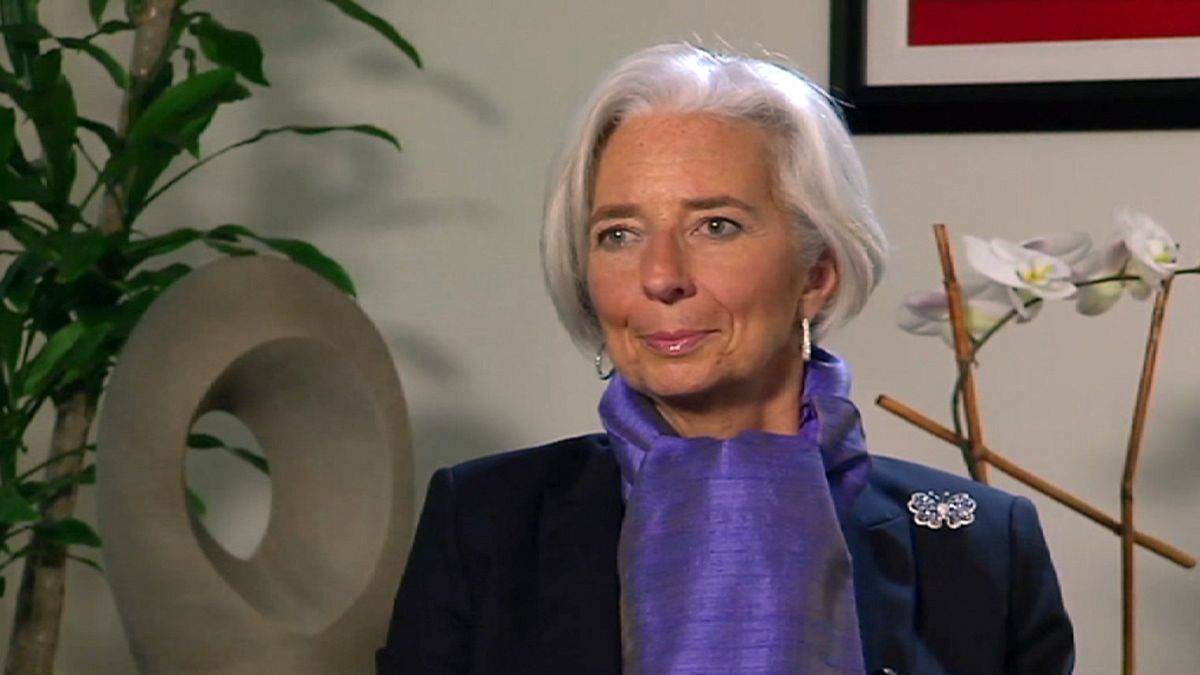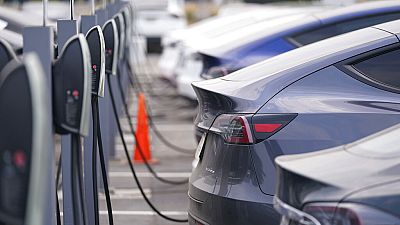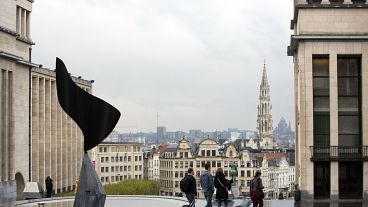IMF Managing Director Christine Lagarde has a number of pressing problems at the IMF/World Bank Spring Meeting in Washington.
The political instability surrounding Ukraine has the potential to damage the global economy and will be high on the agenda at the meeting of finance ministers and central bankers.
Weak and slow economic growth in the eurozone could also consign a generation of young people to a bleak future without work, money and influence.
Euronews correspondent Stefan Grobe spoke to Christine Lagarde ahead of the crucial meeting.
Stefan Grobe, euronews: “Thank you for being with us today on the eve of the IMF Spring Meeting here in Washington, DC. Let me start by asking you about the global context of this year’s talks. We have unbalanced growth, massive unemployment, deflation risks, monetary tapering in progress, and all of a sudden we have political instability, not at some distant place in the world, but right on Europe’s doorstep. Give us a sense of how all that will shape the discussions at the Spring Meeting?”
Christine Lagarde: “It’s a balance of positive and negative. What I’m certain is that the media will find of lots of things to write about, and a trend will certainly be Ukraine which has been the centre of attention for the last few weeks and where our team has been on the ground focused on figuring out what the economy is about in Ukraine, what the numbers are, what the reserves are, who is doing what and negotiating with the authorities a programme that will help them restore the economic situation, re-establish the rule of law in many corners, and dealing with issues such as the monetary policy, the exchange rate of the country and the energy prices and lots of structural reforms that will have to take place.”
euronews: “In Europe, we see growing inequality and a high level of unemployment, especially youth unemployment, and you mention this in every speech. What are you telling youngsters who are worried? Is there hope that this ‘low growth trap’, as you have called it, will not slam shut?”
Lagarde: “The ‘low growth trap’ is the risk in the medium term if the right policies are not decided on and if there is no international cooperation and if that was the case, those economies would not be creating the jobs that are needed for the young generation which is coming full of enthusiasm to the job market to find access and jobs. So what we are saying is, the economy is turning the corner, but is moving too slowly, the growth is too weak, and it needs to be supported by the right mix of monetary policy, fiscal policies and, most importantly, because there is not that much space between these two categories, structural reforms – one of which being a better job market.”
euronews: “You just mentioned that the eurozone economy is growing only very, very slowly, and the IMF forecasts are just north of 1.0 percent for this year and next. If we have a major international crisis on our hands with potentially unpredictable energy problems, can even the small growth rate be sustained? In other words, is Vladimir Putin threatening the recovery in Europe?”
Lagarde: “Instability, uncertainty, geopolitical fragility do not facilitate that necessary recovery job that policymakers have on their hands. But nothing comes without opportunities, you know. And although what’s happening there is a challenge, it also requires that countries re-examine their energy policy mix and the established routines they are operating under. It requires that Ukraine restores its economic policy, restores the rule of law, deals with governance, eliminates its corruption. All of those are positive factors that could result from something which is full of uncertainty.”
euronews: “On Ukraine. The financial support of the international community amounts to 27 billion dollars over the next two years, of which $14 billion to $18 billion will come from the IMF – if Ukraine can put in place a very ambitious programme of structural reforms. How realistic is this given the massive level of corruption in that country and the continuing military threat from Russia?”
Lagarde: “The performance of the country will be a factor of the determination of its people and its authorities. Without that ownership, that determination, things will not happen. But if there is that collective drive to eliminate corruption, to establish good governance, to have good procurements, to have true prices for energy and to own their economic destiny, it will happen. And the international community will support those countries.”
euronews: “Following the annexation of Crimea, global markets reacted only moderately, if at all. Is it that global investors just don’t care about Ukraine? And, if that is the case, who is paying the economic price for Russian aggression?”
Lagarde: “You know, there have been consequences to the Ukrainian situation, as you call it. For instance, the currency has gone down by about 30 percent, so that was a market adjustment of significant nature. It followed the decision by the central bank to no longer support a pegged currency, as it was. Equally, there has been a significant outflow of capital from Russia to other parts of the world. So investors actually recognise when it’s time to move.”



